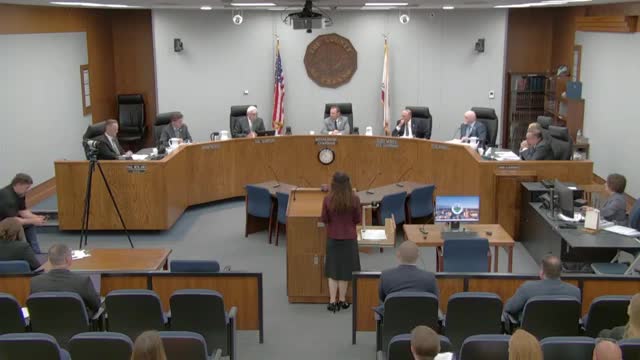Controversy Erupts Over Key Energy Storage Project Approval
November 06, 2024 | Fresno County, California
This article was created by AI summarizing key points discussed. AI makes mistakes, so for full details and context, please refer to the video of the full meeting. Please report any errors so we can fix them. Report an error »

In a recent government meeting, the Board of Supervisors addressed significant developments regarding agricultural land use and renewable energy projects. The primary focus was on a petition from NextEra Energy Resources, seeking to cancel an agricultural land conservation contract for a 160-acre parcel to facilitate the establishment of a battery storage facility.
The Agricultural Land Conservation Committee had recommended denial of the petition, citing concerns over the potential impact on adjacent agricultural lands. However, Andrew Hayman, the lead developer for the Key Energy Storage project, argued that the Environmental Impact Report (EIR) had concluded that the proposed use would not significantly affect surrounding agricultural or open space areas. This assertion was met with skepticism from some board members, who noted the lack of compelling evidence to support the claim that the project would not encourage further agricultural land conversion.
Public comments highlighted the economic benefits of the project, with representatives from the International Brotherhood of Electrical Workers and Cupertino Electric emphasizing job creation and local hiring opportunities. They noted that previous renewable energy projects had successfully employed a significant percentage of local workers, providing living wages and apprenticeship opportunities.
The board ultimately expressed a willingness to reconsider the committee's findings, suggesting that they could support the petition if the second finding regarding agricultural impact could be established. A motion was made to approve the petition, contingent upon the payment of a cancellation fee of approximately $1.98 million, which would be directed to the state.
In a separate agenda item, the board also discussed the adoption of plans and specifications for the Elkhorn recharge facility contract. This included addressing a bid protest from a competing contractor regarding the qualifications of the apparent low bidder. The board was informed that the low bidder had recently obtained the necessary licensing, which cleared the way for the project to proceed.
The meeting underscored the ongoing tension between agricultural land preservation and the push for renewable energy development, as well as the complexities involved in public contracting processes. The board's decisions will have significant implications for both local agricultural practices and the region's energy infrastructure.
The Agricultural Land Conservation Committee had recommended denial of the petition, citing concerns over the potential impact on adjacent agricultural lands. However, Andrew Hayman, the lead developer for the Key Energy Storage project, argued that the Environmental Impact Report (EIR) had concluded that the proposed use would not significantly affect surrounding agricultural or open space areas. This assertion was met with skepticism from some board members, who noted the lack of compelling evidence to support the claim that the project would not encourage further agricultural land conversion.
Public comments highlighted the economic benefits of the project, with representatives from the International Brotherhood of Electrical Workers and Cupertino Electric emphasizing job creation and local hiring opportunities. They noted that previous renewable energy projects had successfully employed a significant percentage of local workers, providing living wages and apprenticeship opportunities.
The board ultimately expressed a willingness to reconsider the committee's findings, suggesting that they could support the petition if the second finding regarding agricultural impact could be established. A motion was made to approve the petition, contingent upon the payment of a cancellation fee of approximately $1.98 million, which would be directed to the state.
In a separate agenda item, the board also discussed the adoption of plans and specifications for the Elkhorn recharge facility contract. This included addressing a bid protest from a competing contractor regarding the qualifications of the apparent low bidder. The board was informed that the low bidder had recently obtained the necessary licensing, which cleared the way for the project to proceed.
The meeting underscored the ongoing tension between agricultural land preservation and the push for renewable energy development, as well as the complexities involved in public contracting processes. The board's decisions will have significant implications for both local agricultural practices and the region's energy infrastructure.
Don't Miss a Word: See the Full Meeting!
Go beyond summaries. Unlock every video, transcript, and key insight with a Founder Membership.
✓
Get instant access to full meeting videos
✓
Search and clip any phrase from complete transcripts
✓
Receive AI-powered summaries & custom alerts
✓
Enjoy lifetime, unrestricted access to government data
30-day money-back guarantee

